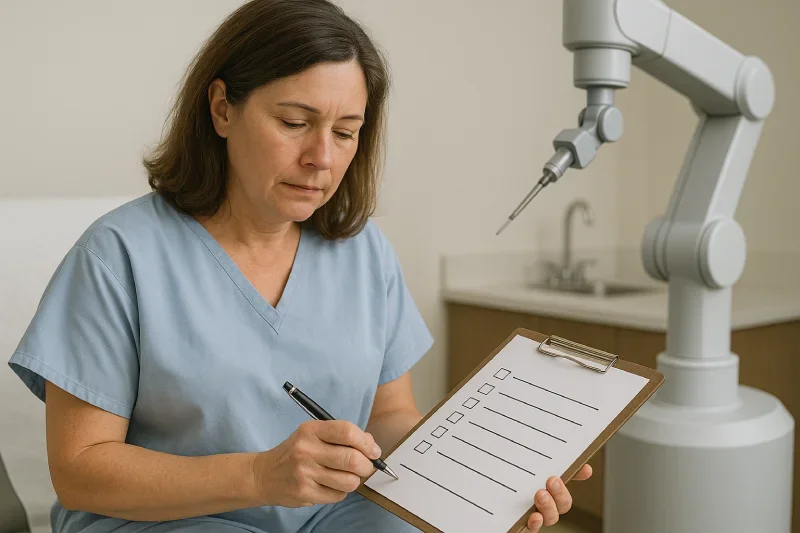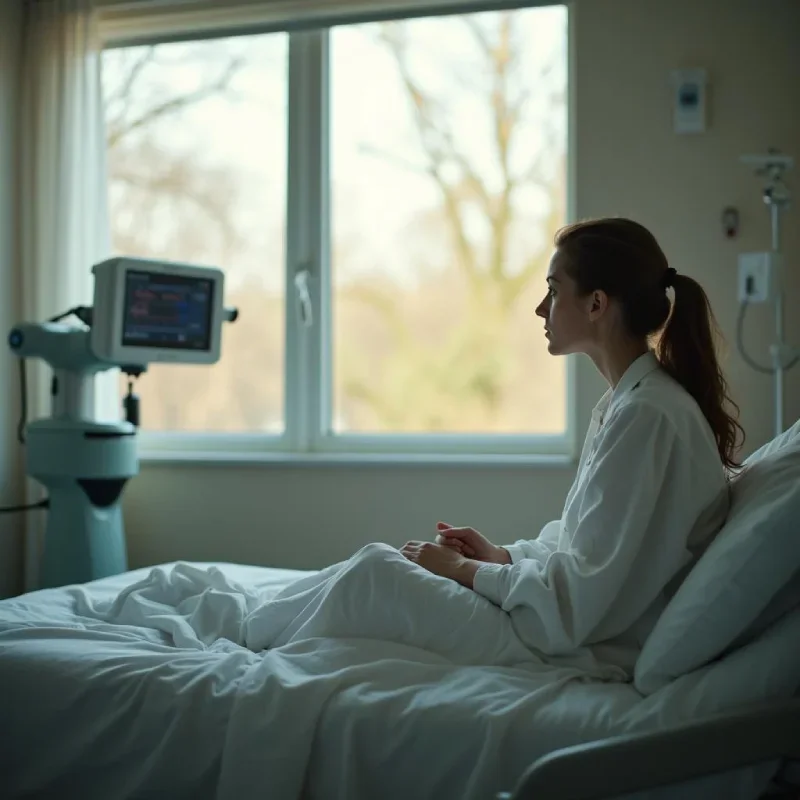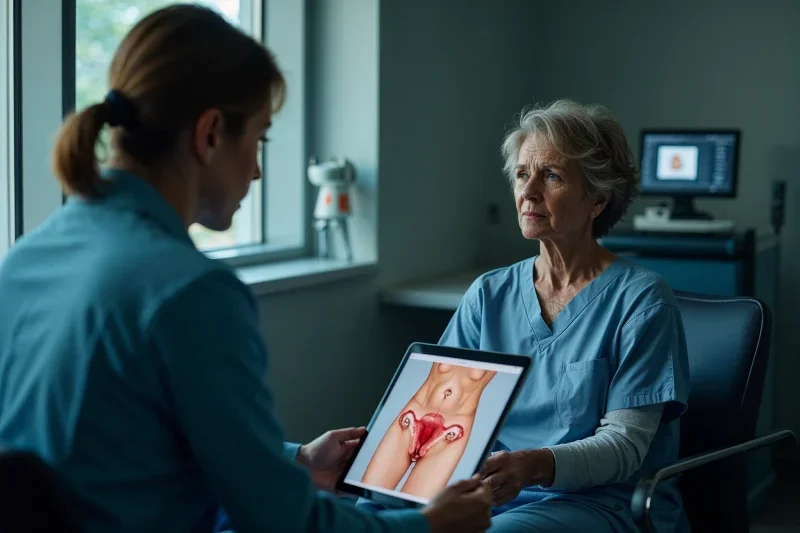Who Is a Candidate for Robotic Essure Reversal
Categories:
By: Ethan Cole
Understanding the candidate requirements for robotic Essure reversal is essential for women considering this advanced surgical option to restore fertility. Robotic Essure reversal is a specialized procedure designed for those who previously had Essure implants as permanent birth control but now wish to conceive naturally.
Not everyone with Essure implants is a suitable candidate for this intricate surgery. Factors such as age, overall reproductive health, the condition of fallopian tubes, and fertility goals all play critical roles in determining candidacy.
A thorough medical evaluation with a knowledgeable surgeon is necessary to assess whether robotic Essure reversal aligns with one's individual health and family planning objectives.
Key Takeaways
Robotic Essure reversal restores fertility by removing Essure coils and reconstructing fallopian tubes, offering women the chance for natural conception when performed by an experienced reproductive surgeon.
Not all women are candidates; suitability depends on age, ovarian reserve, reproductive health, fallopian tube condition, and absence of infections or severe pelvic abnormalities confirmed during thorough medical evaluation.
Younger women under 40 typically experience higher success rates due to stronger ovarian reserve and better egg quality, making age a significant factor in determining fertility outcomes after reversal.
Certain conditions like hydrosalpinx, extensive scar tissue, missing tubal segments, or severe uterine abnormalities can reduce success rates or exclude women from being eligible for robotic Essure reversal.
Robotic reversal offers one-time surgery with potential for multiple natural pregnancies, while IVF may be better for older women, severe tubal damage, or additional fertility challenges such as male factor infertility.
Choosing an experienced surgeon skilled in robotic microsurgery, preferably with extensive Da Vinci Surgical System expertise, significantly improves surgical precision, reduces risks, shortens recovery, and enhances overall fertility outcomes.
Understanding Essure and Why Reversal Is Needed
Essure was introduced as a permanent, non-hormonal birth control method that blocks the fallopian tubes through a minimally invasive procedure. While designed to be a lifelong solution for contraception, some women later seek to reverse this procedure due to a change in reproductive plans or due to experiencing complications caused by the device itself.
What Are Essure Implants?
Essure implants are small, flexible metal coils that are inserted into the fallopian tubes via the vagina, cervix, and uterus during an outpatient procedure. Once in place, the coils stimulate scar tissue formation that blocks the tubes, preventing sperm from reaching eggs and thus preventing pregnancy naturally. The procedure requires no incisions and typically does not require general anesthesia, making it quicker and less invasive than traditional tubal ligation surgery.
Common Symptoms and Complications
Although many women tolerate Essure implants well, a significant number have reported a variety of symptoms and complications that have led them to consider Essure removal or reversal:
Chronic pelvic or abdominal pain
Heavy or irregular menstrual bleeding
Device migration or displacement from the fallopian tubes
Perforation of the fallopian tubes, uterus, or surrounding organs
Allergic reactions including itching, rash, hives, and swelling (often due to nickel sensitivity)
Fatigue, headaches, migraines
Pain during intercourse (dyspareunia)
Hair loss or hair growth in unusual places
Mood swings, depression, anxiety, brain fog
Unintended pregnancy, including risk of ectopic pregnancy
Urinary tract infections or bladder infections
Inflammation or swelling of vaginal or cervical tissue
These complications can arise shortly after the procedure or develop over time. For some women, the symptoms severely impact quality of life and reproductive health, making Essure reversal an important consideration.
What Is Robotic Essure Reversal?
Robotic Essure reversal is a minimally invasive surgical procedure designed to restore fertility in women who previously had Essure devices implanted for permanent birth control. This procedure involves the precise removal of Essure coils implanted in the fallopian tubes and careful reconstruction of the tubes to allow natural conception. The use of robotic technology enhances surgical precision and reduces recovery time compared to traditional methods.
How the Da Vinci Surgical System Works
The Da Vinci Surgical System is a cutting-edge robotic platform that facilitates complex surgeries through small incisions. It consists of a surgeon console where the surgeon sits and controls robotic arms equipped with miniaturized instruments and a high-definition 3D camera. The system translates the surgeon's hand movements into precise micro-movements of the instruments inside the patient’s body, providing enhanced visualization, dexterity, and control. This allows for meticulous removal of Essure devices and delicate reconstruction of the fallopian tubes.
Benefits of Robotic vs. Traditional Surgery
Robotic Essure reversal offers several advantages over traditional open or laparoscopic surgery, including:
Smaller incisions leading to minimal scarring and less pain
Enhanced 3D visualization for better detail of anatomical structures
Improved dexterity and precision in reconnecting fallopian tubes
Shorter hospital stays, often outpatient or same-day discharge
Faster recovery and reduced postoperative discomfort
Lower risk of complications such as infection and bleeding
Potentially higher success rates in restoring fertility
These benefits contribute to improved outcomes and patient satisfaction, making robotic Essure reversal an appealing option for women aiming to regain fertility.
Candidate Criteria for Robotic Essure Reversal
Determining who is a suitable candidate for robotic Essure reversal surgery is a critical step in ensuring the best possible outcomes. Not all women with Essure implants are eligible for reversal, and the decision depends on multiple factors including age, fertility goals, medical history, and anatomical considerations. A consultation with a specialist is necessary to evaluate these factors comprehensively.
Age, Fertility Goals, and Medical History
Age plays an important role in fertility and the success rate of Essure reversal. Younger women typically have higher pregnancy success rates. Candidates should have a strong desire to conceive naturally and no significant medical conditions that would contraindicate surgery. Detailed evaluation of reproductive health, including ovarian reserve and partner’s fertility status, is essential.
Exclusion Factors (e.g., Hydrosalpinx, Scar Tissue)
Certain conditions make robotic Essure reversal unsuitable or less likely to succeed. These include the presence of hydrosalpinx (fluid-filled fallopian tubes), extensive scar tissue blocking fallopian tubes, or severe uterine abnormalities. Women who have had previous tubal ligations or one fallopian tube removed may also have reduced chances of success.
Candidate Criteria and Exclusion Factors Table
|
Criteria for Candidacy |
Exclusion Factors |
|
Desire for natural conception |
Hydrosalpinx (fluid-filled fallopian tubes) |
|
Adequate ovarian reserve and reproductive potential |
Extensive tubal or pelvic scar tissue |
|
Both fallopian tubes anatomically suitable for reconnection |
Severe uterine or cervical abnormalities |
|
No active pelvic infection or malignancy |
Previous sterilization with no tubal segments left |
|
Reasonable general health for surgery |
Allergy to materials used in surgery or anesthesia |
|
No significant male partner infertility |
Presence of unexplained vaginal bleeding |
Robotic Reversal vs. IVF: Which Is Right for You?
When considering options for restoring fertility after Essure sterilization, women often weigh robotic Essure reversal surgery against in vitro fertilization (IVF). Both approaches have unique advantages and challenges depending on individual medical and lifestyle factors.
Comparison Table: Robotic Essure Reversal vs. IVF
|
Aspect |
Robotic Essure Reversal |
In Vitro Fertilization (IVF) |
|
Procedure |
Minimally invasive surgery to remove Essure and reconnect fallopian tubes |
Controlled ovarian stimulation, egg retrieval, fertilization, and embryo transfer |
|
Cost |
$7,000 - $15,000 (one-time surgery cost, varies by location) |
$10,000 - $20,000 per IVF cycle |
|
Success Rate |
~40-60% cumulative pregnancy rates over 1-2 years (age-dependent) |
~30-50% pregnancy rate per cycle (age and clinic dependent) |
|
Recovery Time |
2-4 weeks post-surgery |
Minimal physical recovery, but requires multiple clinic visits and hormone shots |
|
Number of Pregnancies Possible |
Multiple pregnancies possible from one surgery |
Each IVF cycle offers one chance; multiple cycles often needed |
|
Risks |
Surgical risks including bleeding, infection, tubal damage, ectopic pregnancy |
Ovarian hyperstimulation syndrome, multiple pregnancies, medication side effects |
|
Considerations |
Best for women with healthy ovarian reserve, fewer fertility issues, and desire for natural conception |
Preferred for older women, those with severe tubal damage, or male factor infertility |
|
Time to Pregnancy |
Variable; months to over a year post-surgery |
Usually faster conception per cycle but may require multiple cycles |
|
Emotional and Physical Burden |
Surgical recovery but no hormone injections |
Hormone injections and frequent medical appointments |
Factors That Influence the Best Choice
Age is a crucial factor, with younger women typically having higher success with reversal.
Ovarian reserve and overall reproductive health guide candidacy for either procedure.
Personal preference regarding natural conception and tolerance for surgery or IVF protocol.
Financial considerations, as IVF can be more expensive over multiple cycles.
Presence of other fertility issues such as male factor infertility may incline toward IVF.
Choosing between robotic Essure reversal and IVF requires careful evaluation of these factors with a fertility specialist to tailor the approach to individual needs and goals.
Choosing the Right Specialist for Your Reversal
Selecting the right surgeon is a crucial part of a successful robotic Essure reversal. Given the technical complexity of the procedure, experience and specialized training in robotic microsurgery play a vital role in optimizing outcomes. Patients should seek a specialist who combines expertise, excellent patient care, and a proven track record.
Experience With Robotic Procedures
Robotic Essure reversal requires advanced surgical skills that go beyond general gynecologic surgery. Specialists should have extensive experience with the Da Vinci Surgical System or similar robotic platforms and a focus on tubal reversal procedures. Many leading robotic reversal surgeons have performed hundreds of these cases, leading to higher success rates and fewer complications. Board certification in gynecology and reproductive surgery, along with subspecialty training in minimally invasive and fertility restoration surgery, are good indicators of expertise.
Questions to Ask Your OB-GYN or Surgeon
Before undergoing Essure reversal, consider asking your surgeon important questions such as:
How many robotic Essure reversals have you performed, and what is your success rate?
What is your experience with the Da Vinci Surgical System or other robotic platforms?
Can you explain the risks, recovery time, and expected outcomes of the surgery?
What alternatives to surgery are available based on my medical history?
What kind of support and counseling do you provide before and after the procedure?
How do you handle complications if they arise during or after surgery?
Are you affiliated with a hospital or fertility center specializing in reproductive surgery?
Choosing a well-qualified surgeon not only improves surgical success but also ensures comprehensive care tailored to each patient’s fertility goals and health status.
Conclusion
Robotic Essure reversal offers a promising option for women seeking to restore their fertility after permanent birth control with Essure implants. However, being a candidate for this advanced procedure depends on careful evaluation of multiple factors including age, reproductive health, and the presence of any complications or anatomical challenges.
The use of robotic technology enhances surgical precision, supporting better outcomes and quicker recovery compared to traditional methods. When deciding between robotic reversal and alternatives like IVF, it is important to consider success rates, costs, and personal fertility goals. Most importantly, choosing an experienced specialist skilled in robotic microsurgery is essential to maximizing the chances of a successful reversal and healthy pregnancy.
Women considering this path should seek thorough consultations to fully understand the benefits, risks, and realistic expectations ahead as they embark on this journey to regain fertility.
Take the first step toward restoring your fertility with a personalized consultation from Dr. Jason Neef. With advanced robotic expertise and compassionate care, he’ll help you explore the safest and most effective path to pregnancy. Contact us.
Schedule your Essure reversal consultation today.
Call (817) 568-8731Categories:
Frequently Asked Questions
-
Candidates should have good overall health, absence of active infection, healthy ovarian reserve, tubal segments suitable for reconnection, and no major pelvic abnormalities. Fertility goals and surgical risk tolerance are also evaluated.
-
Younger women, especially under 40, typically have higher success rates due to better egg quality and ovarian reserve. Age affects fertility potential and surgical outcomes.
-
Hydrosalpinx, severe tubal scarring, absent tubal segments, or significant pelvic adhesions can exclude candidates from reversal due to lowered chances of success.
-
Robotic reversal offers natural conception potential and one surgery for multiple pregnancies; IVF cycles have higher cost, faster embryo transfer, and suit those with severe tubal damage or other fertility issues.
-
Tests typically include pelvic ultrasound, hysterosalpingogram (HSG) to evaluate tubes, ovarian reserve blood tests, infection screening, and partner fertility assessment.
-
Risks include infection, bleeding, damage to tubes or uterus, ectopic pregnancy, anesthesia complications, and possible need for further surgeries.
-
Most recover within 2 to 4 weeks, with gradual return to normal activities. Full healing and tubal function may take several months.
-
No: success rates range 40-60%, depending on age, health, and surgeon skill. Fertility cannot be guaranteed after reversal.
-
Maintain a healthy weight, avoid smoking and alcohol, manage chronic conditions, follow surgeon’s recovery instructions, and optimize nutrition for fertility.
-
Look for board-certified OB-GYNs with robotic microsurgery and fertility surgery experience, ask about their reversal volume and success rates, and seek patient testimonials.












